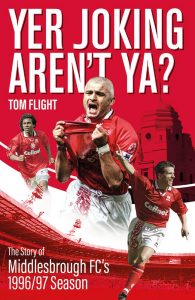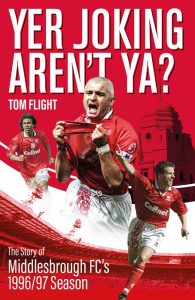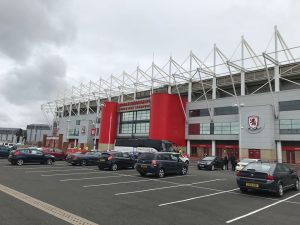Book Review: Yer Joking Aren’t Ya? – The Story of Middlesbrough’s Unforgettable 1996/97 Season by Tom Flight
 On 23 June 2020, Jonathan Woodgate, the third Middlesbrough FC manager in as many years, became the latest managerial casualty at the Riverside, with perennial stalwart Neil Warnock brought in to steer the Boro’ ship out of a relegation battle, which, at the time of writing, is still undecided. But whilst Middlesbrough’s recent campaign and fate are nothing to write home about, it was a very different story in the mid-90s when Boro seemingly looked to be at the start of something special, and it is this period of both promise and eventual disappointment that lifelong Middlesbrough fan Tom Flight reflects on in Yer Joking Aren’t Ya?
On 23 June 2020, Jonathan Woodgate, the third Middlesbrough FC manager in as many years, became the latest managerial casualty at the Riverside, with perennial stalwart Neil Warnock brought in to steer the Boro’ ship out of a relegation battle, which, at the time of writing, is still undecided. But whilst Middlesbrough’s recent campaign and fate are nothing to write home about, it was a very different story in the mid-90s when Boro seemingly looked to be at the start of something special, and it is this period of both promise and eventual disappointment that lifelong Middlesbrough fan Tom Flight reflects on in Yer Joking Aren’t Ya?
The book specifically picks up the story of the 1996/97 season, following the arrival of new chairman Steve Gibson, player-manager Bryan Robson, and a move from their home of 92 years, Ayresome Park, to the forerunner of the modern stadia, the Riverside. It was a season that began on a wave of optimism and ambition, with a team of colourful characters, but proved ultimately to be amongst the most topsy-turvy of campaigns in Boro’s history, ending in their relegation. Flight tells the story of this turbulent season through chapters dedicated to each month of the campaign, giving an overview of the matches and results, which are paired with accompanying chapters which focus on a specific game from each month that was pivotal to Boro’s season. It is a great format that lends itself to avoiding getting bogged down in unnecessary details whilst allowing more in-depth accounts of the moments that matter, and as such it offers a thorough but lively commentary, and Flight’s writing is always engaging and interesting.
Naturally, Flight starts in August 1996, in a game against Liverpool that marked the start of Boro’s epic season and the arrival of the mercurial Fabrizio Ravanelli – perhaps one of the most iconic figures of the North-East club for fans at large. Indeed, if you remember nothing else about Middlesbrough, you most likely remember the silver-haired marksman and his pint-sized Brazilian playmate, Juninho – the two players who featured most notably that season, for better and worse, and that consequently feature most heavily in this book.
The overview chapters are helpfully and ingeniously supplemented at the start by snapshots of Middlesbrough’s position in the table, which in themselves give a sense of the buoyancy at the outset and Boro’s steady decline. Whilst the chapters flesh out the incredible details of a largely forgotten campaign for those not associated with the Boro’ red, including the disappearance mid-season of Brazilian midfielder Emerson, who struggled to settle with his wife in the North-East, and the notorious Friday 20 December date that is etched in Boro’ minds for a virus sweeping through the squad that led to the postponement of their game against Blackburn and the eventual docking of three points that would have made the difference to Boro’s Premier League survival.
Against this backdrop, though, there are moments of real success and achievement, both collectively, with the club reaching not only one but two cup finals – the very first in their history – albeit coming out second-best each time – and individually, most notably for Brazilian wunderkind, Juninho, who has become synonymous with the club and one of those players who is generally admired across the football fraternity. Not only did Juninho scoop a Player of the Month award but also Premier League Player of the Year in that chaotic season – the only player to do so for Middlesbrough, the only Brazilian to do so and one of only five players to do so outside of the big hitters of Manchester United, Arsenal, Chelsea and Liverpool, not to mention the fact of doing so in a relegated team. He is rightly revered on Teesside and had that 1996/97 season not come to a crushing end with relegation, one really has to wonder how things may have turned out for Juninho’s Premier League career, for the league and Middlesbrough itself. Who knows, as this mad 2019/20 campaign comes to an end, instead of contemplating Boro’s Championship survival, we may have seen a team continuing the legacy of Juninho pushing at the right end of the Premier League, with Ravanelli as manager and Emerson happily retired in Teesside. After all, going on the 1996/97 season as Tom Flight’s book recounts it, stranger things have happened for the team from the North-East, and the author offers a memorable and enjoyable account of that most surreal of seasons in the history of Middlesbrough Football Club.
(Pitch Publishing Ltd. April 2020. Hardback 224pp)
Jade Craddock
 As football in the Premier League and the Championship prepares to return after the COVID-19 outbreak, titles, promotions, and relegations will be fought for behind closed doors. For Middlesbrough, the remaining nine games are vital as they look to ensure their survival in the Championship. Ahead of this unusual end of season, FBR caught up with Tom Flight (TF) who has released a book about an incredible season in the Boro’s history.
As football in the Premier League and the Championship prepares to return after the COVID-19 outbreak, titles, promotions, and relegations will be fought for behind closed doors. For Middlesbrough, the remaining nine games are vital as they look to ensure their survival in the Championship. Ahead of this unusual end of season, FBR caught up with Tom Flight (TF) who has released a book about an incredible season in the Boro’s history. (FBR): In the first season back in the Premier League, Middlesbrough finished 12th, was there a sense of optimism at the start of the 1996/1997 season?
(FBR): In the first season back in the Premier League, Middlesbrough finished 12th, was there a sense of optimism at the start of the 1996/1997 season?